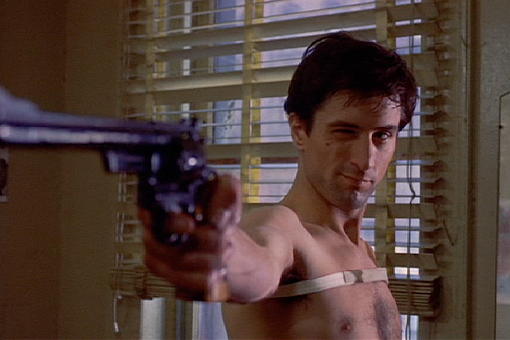By Peter Wertz · May 6, 2011

Martin Scorsese and Robert De Niro are New York City guys, through and through. Born there, raised there, and like a couple of Gangster Woody Allens, treating the city as their muse and making their best films there. It's with this unyielding connection in mind that I found myself struck by Taxi Driver's portrayal of the Apple. New York City is a hellhole, covered in sweat and grime, its streets trafficked by hookers and killers. It is a truly miserable place. This could mean a number of things from the Director's point of view: it could be the truth of the city's underworld in the 1970's, or just the way the city looks to Travis Bickle, or, most probably, it is simply the way Scorsese sees the world. Dark and dirty, with the occasional intimation that people aren't entirely hopeless.
Travis Bickle (De Niro) is one of the most iconic characters of all time, and it's easy enough to see why. Taxi Driver is a film devoted to one man's cogitations; a monologic analysis of a city, and the depravity he sees and feels within it. The dynamics of Travis Bickle's character, what makes him so memorable and significant, is his disgust with and simultaneous contribution to the city's character. His opening monologue is a rant against what he considers the diseases of depravity and hedonism, yet minutes later Bickle takes in a porno flick. This contradiction is persistent and the element of Bickle's character that keeps you wondering which side of the line he will fall on. And while his intense and often violent appraisals give him weight, it is the addition of Bickle's genuine innocence that makes him sympathetic. He is a man unable to relate to other people. The kind of man who says sincerely, "I believe that someone should become a person, like other people." His obsession with, courting of, and eventual separation from the prurient Betsy (Cybill Shepherd) is an exercise in futility, and an experiment that the whole audience knows will end in heartbreak. When Travis wins her over, it has much less to do with his own charm than her curiosity and vanity. She loves attention, and he, a lonely insomniac, can give it endlessly. It is agonizing to watch this poor, besotted wreck imagine a future where there categorically is none. But this innocence, this guilelessness is precisely what insures the audience's investment in Travis.
Taxi Driver is a supremely off-putting film to watch. The score by Bernard Herrmann is the last of his career, and it vacillates between darkness and sex, like so much of the film's scenery. The throbbing gloom of the music is all about tension and release, which is essentially the point of Taxi Driver. So much of the film is intended to fill viewers with dread, to make them sweat, to make them wonder precisely when Travis will snap. At first there are just minimal implications of Travis' instability; the violent sinkholes of his narration, where he goes off on tangents that rival the Watchmen's Rorschach for their bile, or the glimpses into his squalid apartment. The point of view is entirely Bickle's, and so these significant character traits are treated minimally. But once he starts to break, once he starts to reveal the possibilities of his nature, this becomes an entirely different film. Who's to say whether or not Scorsese or screenwriter Paul Schrader intended genre ambiguity? But it's there nonetheless, a film that starts as a subtle character study and ends in a bloodbath.
And that notorious bloodbath is something to see. As I said before, Taxi Driver is all about the build up and release, spending approximately an hour and a half of tense accumulation before breaking the dike. There are a number of allusive moments, where it feels as though the end of the rope has been reached, but when Travis finally acts on his impulses, it seems to come from nowhere. The lead up to this final point of collapse is Travis' bizarre relationship with a twelve and a half year old prostitute named Iris (Jodie Foster) and his assay of her pimp, Sport (Harvey Keitel). Though not far from the truth, Travis' assumptions are nonetheless simplified, and lead him to the type of vigilante justice a sane person simply wouldn't be capable of. This climactic scene is surely bloody, portraying violence abruptly and without any romance. It's something Scorsese does well and has done often, though this feels like the impetus. An uncoated, reckless, bloody mess of a shootout.
It occurred to me that I haven't yet spoken of De Niro's career-defining performance. What is there to say? It's incredible for its subtlety. If you give a thousand actors this role, none of them will pace it the way De Niro does. Most of the film is slow, and the character slowly taking stock. Yes, there's the iconic "You talkin' to me?" scene, but even that is more subdued than history would like to believe. Travis Bickle is thoroughly unhinged, but it's internally, and as the audience catches only minor glimpses here and there, the penultimate payoff is so much more successful. In one of the film's final moments, as a cop surveys the carnage and we finally take in De Niro's Bickle in all his bloody success, he raises a dripping finger to his temple and pulls the trigger. It is, to be sure, one of the most hair-raising moments in film.
Taxi Driver is one of those flick's that, particularly in hindsight, suggests the beginning of a couple of truly incredible career paths. Though Scorsese's Mean Streets came first, it doesn't quite carry the weight or quality of Taxi Driver nor does it feel quite so timeless. Taxi Driver marks the irrefutable beginning of one of cinemas most compelling partnerships. It is a brooding, occasionally frightening glimpse into New York in the 1970s, and the types of characters the city inspired.